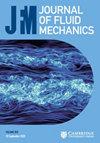Fluid–acoustic–structure resonance mechanism of a plane cascade via a low-speed wind tunnel test
IF 3.9
2区 工程技术
Q1 MECHANICS
引用次数: 0
Abstract
Acoustic resonance is an important factor that contributes to aeroengine compressor failure. In this study, a plane cascade of compressor blades was designed to reproduce acoustic resonance via a low-speed wind tunnel test. A high-frequency hot-wire, microphone and strain gauge were used to synchronously measure the fluid, acoustic and structural parameters. We analysed the variation in the amplitude and frequency of the multi-field parameters with increasing mean flow velocity and explored the multi-field interaction mechanism that induces the acoustic resonance of the plane cascade. The plane cascade effectively reproduced the acoustic resonance phenomenon. The first-order acoustic-mode frequency of the plane cascade flow duct, second-order torsional vibration mode frequency of the blade and shedding mode frequency of the tip clearance leakage vortex were equal under acoustic resonance. The fluid, acoustic and structural fields showed a strong interaction effect, achieving the maximum blade vibration amplitude and causing fatigue cracks of torsional vibration at the blade root. The frequency lock-in region of the compressor plane cascade was divided into an ‘acoustic–structure’ interaction region, a ‘fluid–acoustic–structure’ interaction region and a first-order acoustic-mode dominant region with increasing mean flow velocity, which demonstrates an interesting phenomenon in which the fluid–acoustic–structure modes compete: acoustic mode > blade vibration mode > vortex shedding mode. The results demonstrate a unique approach to the study of acoustic resonance that provides insight into the acoustic resonance mechanism in a cascade of compressor blades.通过低速风洞试验研究平面级联的流声结构共振机理
声共振是导致航空发动机压缩机故障的一个重要因素。在这项研究中,设计了一个压缩机叶片平面级联,通过低速风洞试验重现声共振。使用高频热线、麦克风和应变仪同步测量流体、声学和结构参数。我们分析了多场参数的振幅和频率随平均流速增加而变化的情况,并探索了诱发平面级联声共振的多场相互作用机制。平面级联有效地再现了声共振现象。在声共振作用下,平面级联流道的一阶声学模态频率、叶片的二阶扭转振动模态频率和叶尖间隙泄漏涡的脱落模态频率相等。流体场、声场和结构场产生了强烈的相互作用,使叶片振幅达到最大,并在叶片根部产生了扭转振动疲劳裂纹。压气机平面级联的锁频区被划分为 "声-结构 "相互作用区、"流-声-结构 "相互作用区以及随平均流速增加的一阶声学模式主导区,这表明了一种有趣的流-声-结构模式竞争现象:声学模式;叶片振动模式;涡流脱落模式。研究结果展示了一种独特的声共振研究方法,有助于深入了解压缩机叶片级联的声共振机制。
本文章由计算机程序翻译,如有差异,请以英文原文为准。
求助全文
约1分钟内获得全文
求助全文
来源期刊
CiteScore
6.50
自引率
27.00%
发文量
945
审稿时长
5.1 months
期刊介绍:
Journal of Fluid Mechanics is the leading international journal in the field and is essential reading for all those concerned with developments in fluid mechanics. It publishes authoritative articles covering theoretical, computational and experimental investigations of all aspects of the mechanics of fluids. Each issue contains papers on both the fundamental aspects of fluid mechanics, and their applications to other fields such as aeronautics, astrophysics, biology, chemical and mechanical engineering, hydraulics, meteorology, oceanography, geology, acoustics and combustion.

 求助内容:
求助内容: 应助结果提醒方式:
应助结果提醒方式:


